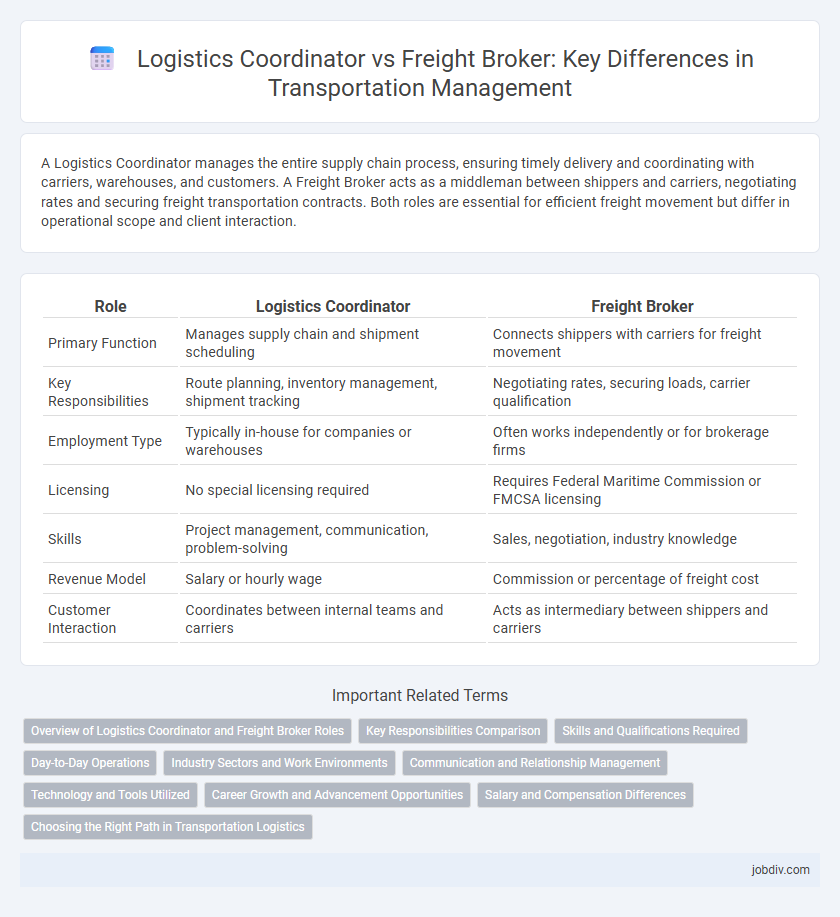A Logistics Coordinator manages the entire supply chain process, ensuring timely delivery and coordinating with carriers, warehouses, and customers. A Freight Broker acts as a middleman between shippers and carriers, negotiating rates and securing freight transportation contracts. Both roles are essential for efficient freight movement but differ in operational scope and client interaction.
Table of Comparison
| Role | Logistics Coordinator | Freight Broker |
|---|---|---|
| Primary Function | Manages supply chain and shipment scheduling | Connects shippers with carriers for freight movement |
| Key Responsibilities | Route planning, inventory management, shipment tracking | Negotiating rates, securing loads, carrier qualification |
| Employment Type | Typically in-house for companies or warehouses | Often works independently or for brokerage firms |
| Licensing | No special licensing required | Requires Federal Maritime Commission or FMCSA licensing |
| Skills | Project management, communication, problem-solving | Sales, negotiation, industry knowledge |
| Revenue Model | Salary or hourly wage | Commission or percentage of freight cost |
| Customer Interaction | Coordinates between internal teams and carriers | Acts as intermediary between shippers and carriers |
Overview of Logistics Coordinator and Freight Broker Roles
A Logistics Coordinator manages the flow of goods and materials by planning routes, tracking shipments, and coordinating with carriers to ensure timely delivery within supply chains. A Freight Broker acts as an intermediary between shippers and carriers, negotiating transportation rates and securing freight capacity without handling the cargo directly. Both roles require strong communication skills and knowledge of transportation regulations to optimize efficiency and reduce costs.
Key Responsibilities Comparison
A Logistics Coordinator manages supply chain operations by organizing shipments, tracking inventory, and coordinating with carriers to ensure timely delivery. Freight Brokers act as intermediaries between shippers and carriers, negotiating freight rates and securing transport contracts without taking possession of the goods. Both roles require expertise in transportation regulations, carrier management, and customer communication but differ in operational scope and responsibility for physical shipments.
Skills and Qualifications Required
Logistics coordinators require strong organizational skills, proficiency in supply chain management software, and the ability to manage scheduling and inventory tracking efficiently. Freight brokers need excellent negotiation skills, knowledge of transportation regulations, and the ability to establish relationships with carriers and shippers. Both roles demand strong communication skills and an understanding of freight documentation and compliance standards.
Day-to-Day Operations
Logistics Coordinators manage day-to-day shipment scheduling, tracking inventory, and coordinating with carriers to ensure timely delivery of goods. Freight Brokers focus on negotiating contracts, securing loads from shippers, and matching freight with carriers to optimize transportation efficiency. Both roles require strong communication skills, but Logistics Coordinators handle operational execution while Freight Brokers emphasize market relationship management.
Industry Sectors and Work Environments
Logistics coordinators primarily operate within manufacturing, retail, and distribution sectors, managing supply chain processes and internal transportation logistics. Freight brokers specialize in freight transportation and shipping industries, acting as intermediaries between shippers and carriers to negotiate contracts and rates. Work environments for logistics coordinators often involve office settings within company headquarters, while freight brokers typically work in brokerage firms or operate independently, requiring strong networking and negotiation skills.
Communication and Relationship Management
A Logistics Coordinator manages internal communication with suppliers, carriers, and customers to ensure seamless shipment scheduling and cargo tracking within a company's supply chain. A Freight Broker acts as an intermediary between shippers and carriers, leveraging extensive industry networks to negotiate freight rates and secure capacity. Strong relationship management skills enable both roles to resolve issues promptly, optimize logistics operations, and maintain customer satisfaction.
Technology and Tools Utilized
Logistics coordinators use advanced transportation management systems (TMS) and inventory tracking software to streamline supply chain operations and maintain real-time visibility of shipments. Freight brokers rely heavily on digital freight matching platforms and customer relationship management (CRM) tools to connect shippers with carriers and optimize load assignments. Both roles leverage GPS tracking and electronic data interchange (EDI) to enhance communication and operational efficiency in freight movement.
Career Growth and Advancement Opportunities
Logistics coordinators typically advance by gaining expertise in supply chain management and may move into roles like logistics manager or operations director, benefiting from hands-on experience with inventory control and transportation planning. Freight brokers can expand their career by building robust client networks and securing larger contracts, progressing to roles such as brokerage manager or starting their own freight brokerage firm, leveraging industry knowledge and negotiation skills. Both careers offer growth through specialization in transportation regulations, technology integration, and strategic logistics, with advancement tied to skill development and industry certifications.
Salary and Compensation Differences
Logistics Coordinators typically earn an average salary ranging from $45,000 to $65,000 annually, with compensation packages often including bonuses tied to operational efficiency. Freight Brokers command higher earnings, averaging between $60,000 and $90,000 per year, driven by commission-based pay structures linked to shipment volume and profitability. Variations in salary largely depend on industry experience, geographic location, and the scale of freight handled.
Choosing the Right Path in Transportation Logistics
Logistics coordinators manage supply chain operations, ensuring timely delivery by coordinating with carriers, warehouses, and vendors, which optimizes inventory flow and reduces delays. Freight brokers act as intermediaries, connecting shippers with carriers to negotiate rates and secure shipments without owning transport assets, emphasizing relationship-building and market knowledge. Choosing the right path depends on whether you prefer operational management with direct control over logistics processes or sales-driven facilitation focusing on brokerage and client acquisition.
Logistics Coordinator vs Freight Broker Infographic

 jobdiv.com
jobdiv.com